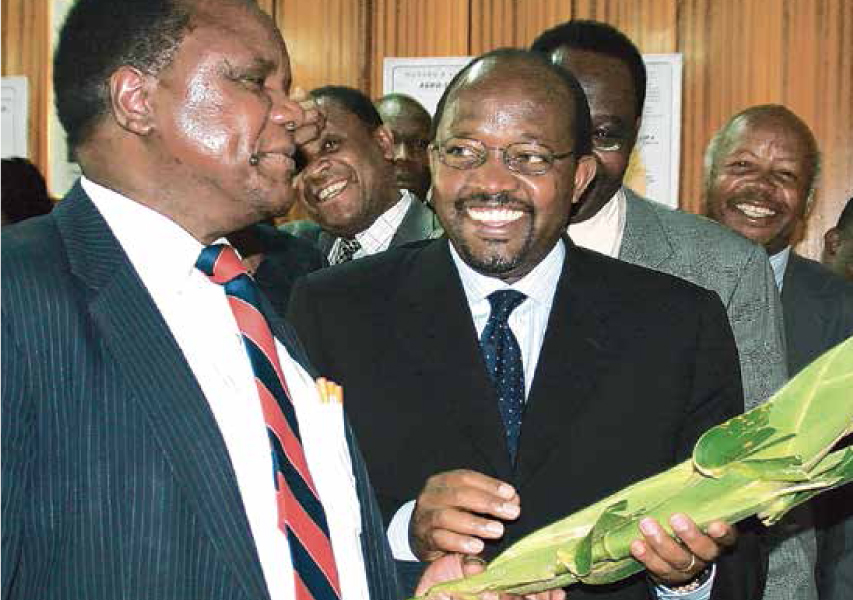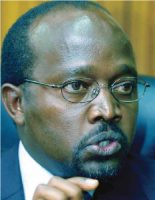
Appointed to the critical Agriculture docket when the farming sector was at its lowest ebb – and in the dispensation of a President who gave his ministers a free hand to apply themselves – Kirwa soon gave farmers a reason to go back to the soil. Agriculture was the backbone of the country’s economy and gave about 80 per cent of Kenya’s population their livelihood, so this was a major achievement for Kirwa, who was joining the Cabinet for the first time.
But it was not his first stint in the ministry, having been Assistant Minister under President Daniel arap Moi from 1998 to 2002. He was also prepared professionally, with a background in agricultural engineering.
Also of significance was that Kirwa was one of the few MPs from the Kalenjin community to be elected on a National Rainbow Coalition (NARC) party ticket in the 2002 General Election that saw Moi and the Kenya African National Union (KANU) party ousted after decades in power. He had also proved himself as a principled person who did not tolerate injustice or poor governance.
Under Kibaki, Kenya had adopted a strategy to revitalise agriculture, which accounted for 26 per cent of the gross domestic product and contributed to 80 per cent of employment and 57 per cent of the national income – both directly and indirectly. This critical ministry has often gone to those who enjoy the complete trust of the President of the day, and Kirwa put this trust to good use, reviving faith in farming that had been lost in the 1980s and 1990s.
He took office when maize farmers had little market, which saw them dispose of their produce at throwaway prices. To reverse the trend, he banned maize imports and it wasn’t long before the farmers were expanding acreage under the staple crop as they serviced loans from the Agricultural Finance Corporation (AFC), which previously were the preserve of a handful of KANU elite. The loans were now available to farmers within a very short time of application.
All the parastatals under the Ministry of Agriculture at the time were revamped on Kirwa’s watch. One of these was the Kenya Seed Company, a public entity that had been established to produce certified maize seeds but which had fallen into private hands in the dying days of the KANU regime.
The Kenya Plant Health Inspectorate Services was also strengthened to ensure that all imported seeds met quality standards, as was the Kenya Agriculture Research Institute (KARI), since renamed Kenya Agriculture and Livestock Research Organisation (KALRO), which was also funded by the exchequer to execute its mandate.
For this, the ministry was often rated the best in performance evaluation, something Kirwa remains proud of to this day. Indeed, Ezra Njau, a breeder at KALRO, credited the former Minister with seed development and revamping the ailing agricultural institutions.
“We managed to produce seeds against certain pests and fungi, which boosted production. Some long-term research, started in his time, such as that aimed at combating stem rust (a virulent wheat disease) is still ongoing,” Njau said, attributing Kirwa’s success to his working with experts.
And according to Lorna Tetu, a large-scale wheat and barley farmer in Narok County as well as a civic leader, Kirwa was responsible for fair appointments to the ministry’s parastatal boards, which she said were previously the preserve of certain ethnic communities.
“He ensured that the boards reflected the face of Kenya. We reaped benefits from tilling our land. When he left, we were left at the mercy of importers,” she said.
Tetu also said AFC loans for farmers whose crops were damaged by the vagaries of weather were either rescheduled or the interests were waived at the Minister’s behest.
“We still remember the good days of the Kibaki administration when agriculture was a worthy undertaking. Kirwa cultivated a close working relationship with Kibaki that bettered the lives of farmers, who work under difficult conditions to produce food for the country,” Tetu said.
So expansive was Kirwa’s docket that it was one of only three ministries to be allocated two assistant ministers. The other two were Education, Science and Technology headed by George Saitoti, who was also Vice President in the Moi era, and Public Service under Geoffrey Parpai. Kirwa was deputised by Wycliffe Osundwa and Joseph Munyao. The Permanent Secretary in the ministry was Godfrey Mate.
Ever since he entered Parliament in 1990, when he contested the Cherangany Constituency by-election and won, Kirwa, despite being in KANU, was never comfortable with Moi’s style of leadership and was a constant thorn in the former President’s side. Representing a cosmopolitan constituency populated by the Kalenjin, Luhya and Kikuyu communities, the soft-spoken, sober-minded politician was comfortable making friends with politicians opposed to the Moi regime. Moi once angrily nicknamed him ‘Makokha’ for his close association with the Bukusu sub-tribe of the Luhya, which opposed KANU.
In the late 1990s, the former teacher joined hands with youthful KANU members such as Cyrus Jirongo, John Sambu and William Ruto to foment rebellion within the party. The “Four Sisters” as they were referred to were itching to grab a piece of the KANU behemoth that was dominated by conservative old guards such as Nicholas Biwott, George Saitoti and Joseph Kamotho. Jirongo, then the MP for Lugari in present-day Kakamega County, was Kirwa’s schoolmate at Mang’u High School and had been instrumental in the re-election of KANU as the ruling party in 1992 through the Youth for KANU ‘92 movement whose money-dishing tactics felled the shilling and drove up inflation.
By 2000, Kirwa had decamped from KANU to the Opposition, becoming an important cog in the wheel that was the National Alliance Party of Kenya (NAK). He worked closely with Kibaki behind the scenes to shape NAK into a formidable coalition that brought together Kibaki’s Democratic Party (DP), Ford-Kenya led by Kijana Wamalwa and Charity Ngilu’s National Party of Kenya. They would be joined by KANU rebels and the Liberal Democratic Party (LDP) to form NARC. Kirwa, Chris Murungaru and former MP for Mwala, Mutua Katuku, were the driving force behind NAK while the principals – Kibaki, Wamalwa and Ngilu – were the public face.
Despite his recognised success in the agriculture sector, it was not all smooth sailing for Kirwa. Soon after taking over, the Minister faced a major challenge when about 3.3 million people faced starvation because of drought and poor harvests. In addition, more than 150,000 camels, 16 million goats and six million cows were at risk of death as harsh weather conditions ravaged many parts of Kenya’s arid and semi-arid (ASAL) areas.
Kirwa announced that the government would disburse money to the National Cereals and Produce Board to purchase two million bags of maize locally and in the Common Market for Eastern and Southern Africa (COMESA) to boost the country’s strategic reserves. But at the time, the country did not have sufficient finances and Kibaki had appealed for USD 76 million to fund emergency relief operations to help those affected by crop failure due to inadequate rainfall.

In May 2007, Kirwa had a rough time in Parliament when he was asked to explain the flouting of the 2005 Notice No. 44 that required potatoes packaged for wholesale should be put in 110-kilogramme bags. Kirwa explained, amid disbelief on the floor of the House, that his ministry had no specific financial allocation for the implementation of Notice No. 44.
But his biggest nightmare was yet to come. Ahead of the 2007 General Election, cheap sugar imports, which he had earlier managed to stop, were dumped in the country and markets were saturated, dealing a big blow to local sugarcane farmers.
Although Kenya was a committed member of COMESA, which allowed certain quotas of imports to make up for shortfalls, sugarcane farmers in the western belt complained that the imports were being used to line the pockets of certain powerful people at a time when Kibaki was about to seek a second term in office.
Kirwa was born in September 1959 and studied at Kapsabet and Mang’u high schools before joining the Kenya Technical Teachers’ College for a diploma in agricultural engineering. He later joined the Jomo Kenyatta University of Agriculture & Technology for a degree in agricultural engineering. From 1986 to 1988, he was a teacher and headmaster at Tilol Secondary School in present-day Uasin Gishu County.
The former Minister also holds a Master of Science in Applied Management and Leadership from the Management University of Africa, and a Master of Arts in International Studies from the University of Nairobi. Known for his fluency in Kiswahili because of his long stay in Tanzania, where a majority of his clan still resides, he is currently studying for a PhD in International Studies at the University of Nairobi.
His entry into Parliament in 1990 came through a by-election when John Kirwa Rotich, who had won the seat in 1988, had his election nullified in court after the long-time holder of the seat, Masinde Muliro, lodged an election petition.
In Parliament, Kirwa had a knack for speaking his mind on matters affecting his constituency, which he represented for nearly two decades. He championed the rights of his people, whose main economic mainstay was agriculture, to access better markets for their produce. He also opposed the dumping of cheap imported grains, which depressed prices especially during harvest season.
In 1997, Kirwa sensationally claimed that army personnel from the Pokot community were leaving the service with arms to take part in activities aimed at destabilising the North Rift region, especially Kitale, an Opposition zone. Cattle rustling, he charged, could have been the entry point of the destabilisation plans that would have seen people being displaced ahead of the General Election that was held in December that year.
It was after the 1997 elections that Kirwa teamed up with Jirongo, Ruto, Wamalwa, Fred Amayo, and then Kwanza MP George Kapten, to form a fall-back party, the United Democratic Movement, were they to be kicked out of KANU. While the group had been dismissed as inconsequential hotheads, it appears that Moi took seriously their potential to divide the ruling party. In September 2000, government operatives attempted to disrupt a fundraising meeting in Bomet presided over by Kirwa and his soul mates Sambu, Jirongo and Kipkalya Kones.
Kirwa retained his Cherangany seat in three polls despite his stance, but as the 2002 elections approached he went headlong into Opposition politics, culminating in the euphoric 2002 NARC victory in which he won the seat on a FORD-Kenya/NARC ticket. He was vanquished in 2007 by Joshua Kutuny, who vied on an Orange Democratic Movement party ticket. Still, those who know him say he lasted as long as he did because he eschewed the practice of using his position to enrich himself.
Even after his loss in 2007, Kibaki appointed him the Inter-Governmental Authority on Development (IGAD) Special Envoy to Somalia Peace and National Reconciliation where he served between 2008 and 2012, demonstrating the President’s confidence in his first Minister for Agriculture.
In 2013, he contested the Trans Nzoia Senate seat on a New FORD-Kenya ticket and lost to FORD-Kenya’s Henry ole Ndiema. In January 2017, Kirwa moved to Musalia Mudavadi’s Amani National Congress and became the party’s deputy leader. In that year’s election, he emerged third in his second bid for the Trans Nzoia Senate seat that was won by Jubilee’s Michael Mbito.
